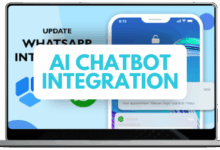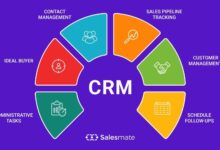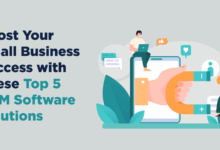AI-Powered CRM Software: A Comprehensive Guide
AI-Powered CRM Software is revolutionizing how businesses manage customer relationships. This powerful technology leverages artificial intelligence to automate tasks, analyze data, and predict customer behavior, ultimately leading to increased efficiency, improved customer satisfaction, and higher revenue. This guide delves into the core functionalities, benefits, challenges, and future trends of AI-powered CRM systems, providing a comprehensive overview for businesses seeking to enhance their customer engagement strategies.
From predictive lead scoring that prioritizes high-potential prospects to AI-driven chatbots providing instant customer support, AI is transforming the CRM landscape. We will explore how these advancements impact sales, marketing, and customer service, offering insights into successful implementation and addressing potential ethical considerations.
Defining AI-Powered CRM Software
AI-powered CRM software represents a significant advancement in customer relationship management, leveraging artificial intelligence to automate tasks, analyze data, and ultimately improve business outcomes. It goes beyond the capabilities of traditional CRM systems by incorporating machine learning and other AI techniques to provide more insightful and actionable information.
AI-powered CRM software enhances the core functionalities of traditional CRM systems by adding intelligent automation and predictive capabilities. These systems manage customer interactions, track sales processes, and analyze customer data, but with AI, this process becomes significantly more efficient and insightful.
Core Functionalities of AI-Powered CRM Software
AI-powered CRM systems offer a range of functionalities designed to streamline operations and enhance customer engagement. These functionalities include automated lead scoring and prioritization, predictive sales forecasting, personalized customer communication, improved customer segmentation, and proactive customer support. The core goal is to improve sales efficiency, increase customer satisfaction, and boost overall revenue.
Key Differences Between Traditional and AI-Powered CRM Systems
Traditional CRM systems primarily focus on data storage and retrieval, offering basic functionalities like contact management, lead tracking, and sales pipeline visualization. AI-powered CRMs, however, go beyond this basic functionality by incorporating machine learning algorithms to analyze data, predict future trends, and automate repetitive tasks. This leads to more efficient workflows, better insights, and ultimately, improved business decisions. For example, a traditional CRM might track sales calls, while an AI-powered system might analyze call recordings to identify key customer pain points and suggest improved sales strategies.
Examples of AI Features Integrated into CRM Software
Several AI features significantly enhance the capabilities of CRM software. Predictive analytics uses historical data to forecast future trends, such as predicting customer churn or identifying high-potential leads. Lead scoring automatically ranks leads based on their likelihood of conversion, allowing sales teams to prioritize their efforts effectively. Chatbots provide instant customer support, answering common questions and resolving simple issues, freeing up human agents to handle more complex tasks. These are just a few examples of how AI is transforming CRM.
Comparison of Leading AI-Powered CRM Solutions
| Feature | Salesforce Einstein | Microsoft Dynamics 365 AI | HubSpot CRM |
|---|---|---|---|
| Predictive Analytics | Strong; offers various predictive models for sales, service, and marketing. | Strong; integrates with Power BI for advanced analytics and reporting. | Good; provides basic predictive lead scoring and churn prediction. |
| Lead Scoring | Excellent; provides detailed scoring based on various factors, including engagement and demographics. | Good; integrates with marketing automation tools for comprehensive lead scoring. | Good; offers a straightforward lead scoring system. |
| Chatbots | Integrated; offers customizable chatbots for various customer interactions. | Integrated; provides pre-built and customizable chatbots for various scenarios. | Integrated; offers chatbot functionality with various integrations. |
| Strengths | Extensive features, strong integration with other Salesforce products. | Powerful analytics, deep integration with Microsoft ecosystem. | User-friendly interface, cost-effective, strong marketing automation capabilities. |
| Weaknesses | Can be complex and expensive. | Steeper learning curve than some competitors. | Fewer advanced AI features compared to Salesforce and Dynamics 365. |
Benefits of AI in CRM
AI is revolutionizing Customer Relationship Management (CRM) systems, offering significant advantages across sales, customer service, and marketing. By automating tasks, providing insightful data analysis, and personalizing interactions, AI-powered CRMs are boosting efficiency and driving revenue growth for businesses of all sizes.
AI Improves Sales Team Efficiency
AI significantly enhances sales team productivity by automating repetitive tasks and providing valuable insights to improve sales strategies. For example, AI-powered lead scoring systems analyze prospect data to prioritize high-potential leads, allowing sales representatives to focus their efforts on the most promising opportunities. Furthermore, AI-driven sales forecasting tools use historical data and predictive modeling to accurately forecast future sales, enabling better resource allocation and strategic planning. This ultimately translates to increased sales conversion rates and a higher return on investment (ROI). Smart CRM systems can even suggest optimal contact times and personalize sales pitches based on individual customer profiles.
AI’s Impact on Customer Service and Support
AI is transforming customer service by providing instant, personalized support and resolving issues efficiently. AI-powered chatbots can handle a high volume of routine inquiries, freeing up human agents to focus on more complex problems. These chatbots can provide 24/7 availability, ensuring customers receive immediate assistance regardless of time zone. Moreover, AI analyzes customer interactions to identify trends and patterns, enabling businesses to proactively address issues and improve customer satisfaction. Sentiment analysis, a key AI feature, allows businesses to gauge customer satisfaction in real-time, enabling quick responses to negative feedback and preventing escalation.
AI Enhances Marketing Campaign Effectiveness
AI significantly boosts marketing campaign effectiveness by enabling personalized targeting and optimized campaign management. AI algorithms analyze customer data to identify segments with similar characteristics and preferences, enabling marketers to tailor campaigns to specific audiences. This results in higher engagement rates and improved conversion rates. Furthermore, AI-powered tools can automate campaign optimization by continuously analyzing performance metrics and adjusting strategies in real-time to maximize ROI. For example, AI can automatically A/B test different ad creatives and messaging to determine the most effective approach.
Hypothetical Case Study: ROI of AI-Powered CRM
Let’s consider a hypothetical mid-sized company, “Acme Corp,” selling software solutions. Before implementing an AI-powered CRM, Acme Corp’s sales team spent significant time on manual data entry, lead qualification, and follow-up. Their customer service team struggled to handle the high volume of inquiries, leading to long wait times and customer dissatisfaction. Their marketing campaigns lacked personalization, resulting in low engagement rates.
After implementing an AI-powered CRM, Acme Corp saw the following changes:
| Metric | Before AI | After AI |
|---|---|---|
| Sales Conversion Rate | 10% | 18% |
| Customer Service Resolution Time | 48 hours | 12 hours |
| Marketing Campaign Engagement Rate | 5% | 15% |
| Customer Churn Rate | 15% | 8% |
Assuming Acme Corp had an annual revenue of $5 million before AI implementation, the 8% increase in conversion rate alone could generate an additional $400,000 in revenue. Improved customer service and reduced churn contribute further to increased profitability. While the initial investment in the AI-powered CRM system might be significant, the substantial increase in revenue and efficiency quickly surpasses the implementation costs, demonstrating a strong ROI. The precise ROI would depend on the specific CRM system, implementation costs, and the company’s individual circumstances. However, this example illustrates the potential for significant financial gains through the strategic adoption of AI in CRM.
AI Features and Their Applications
AI is transforming CRM, moving beyond simple data storage to proactive engagement and predictive analysis. The integration of various AI features significantly enhances a business’s ability to understand its customers, optimize sales processes, and improve overall efficiency. These features, when strategically implemented, contribute to a measurable increase in revenue and customer satisfaction.
Lead Scoring and Prioritization
AI-powered lead scoring automates the process of ranking leads based on their likelihood of conversion. This goes beyond simple demographic data, incorporating behavioral signals like website activity, email engagement, and social media interactions. The system assigns a numerical score to each lead, allowing sales teams to prioritize their efforts on the most promising prospects. For example, a lead who has downloaded multiple white papers, visited pricing pages, and engaged with sales emails would receive a higher score than a lead who only visited the company’s homepage. This targeted approach increases sales efficiency and improves conversion rates by focusing resources on high-potential leads.
Predictive Sales Analytics
This feature uses historical data and machine learning algorithms to predict future sales outcomes. By analyzing past sales patterns, customer behavior, and market trends, the system can forecast sales revenue, identify potential risks, and optimize sales strategies. For instance, a business might use predictive analytics to anticipate a decline in sales during a specific quarter and proactively adjust its marketing campaigns or inventory management. This allows businesses to be more proactive in their decision-making and mitigate potential losses.
Automated Customer Segmentation
AI enables the creation of highly targeted customer segments based on various criteria, including demographics, purchasing behavior, and engagement levels. This goes beyond simple segmentation based on age or location; AI can identify nuanced customer groups with specific needs and preferences. For example, an e-commerce business might use AI to segment customers based on their browsing history and purchase patterns, allowing them to personalize marketing messages and product recommendations for each segment. This leads to increased customer engagement and higher conversion rates.
Chatbots and Conversational AI
AI-powered chatbots provide instant customer support and lead qualification. These virtual assistants can handle routine inquiries, answer frequently asked questions, and guide leads through the sales funnel. For instance, a chatbot can collect basic information from a potential customer, qualify them as a lead, and schedule a call with a sales representative. This frees up human agents to focus on more complex tasks and improves customer satisfaction by providing quick and efficient support.
Personalized Recommendations and Content
AI analyzes customer data to provide personalized product recommendations, targeted marketing content, and customized offers. This improves customer engagement and increases the likelihood of purchases. For example, a streaming service might use AI to recommend movies and TV shows based on a user’s viewing history and preferences. This personalized experience enhances customer satisfaction and encourages continued engagement with the platform. Similarly, an e-commerce site might suggest products based on previous purchases and browsing activity.
Demonstrating AI-Powered Lead Scoring Improves Sales Conversion Rates
AI-powered lead scoring directly impacts sales conversion rates by prioritizing high-potential leads. By focusing sales efforts on leads with higher scores, sales teams can dedicate their time and resources more effectively. Studies have shown that businesses using AI-powered lead scoring experience a significant increase in sales conversion rates, often ranging from 10% to 30% or more, depending on the implementation and other factors. For example, a company might see its conversion rate jump from 5% to 15% after implementing an AI-powered lead scoring system, significantly improving its sales efficiency and overall revenue. This improvement is directly attributable to the system’s ability to identify and prioritize high-potential leads, allowing sales representatives to focus their efforts on the most likely prospects.
Challenges and Considerations
Integrating AI into CRM systems offers significant advantages, but it’s crucial to acknowledge the potential hurdles and ethical implications. A successful implementation requires careful planning, addressing data privacy concerns, and a commitment to responsible AI practices. Ignoring these aspects can lead to unforeseen problems, hindering the benefits and potentially damaging the brand’s reputation.
Integration Challenges
The integration of AI into existing CRM systems can present several technical and operational challenges. Existing systems may lack the necessary infrastructure to support AI functionalities, requiring significant upgrades or replacements. Data migration can be complex and time-consuming, demanding careful planning and resource allocation. Furthermore, ensuring seamless integration between AI components and existing workflows requires specialized expertise and robust testing to prevent disruptions to daily operations. For example, a company attempting to integrate a predictive analytics AI tool into an outdated CRM system might encounter difficulties in data compatibility and processing speed, ultimately delaying the realization of expected benefits.
Data Privacy Concerns
AI-powered CRMs rely heavily on customer data to function effectively. This raises significant privacy concerns, particularly regarding data security and compliance with regulations like GDPR and CCPA. The processing and analysis of sensitive customer information by AI algorithms necessitate robust security measures to prevent unauthorized access and data breaches. Transparency regarding data usage is also crucial to build and maintain customer trust. For instance, failing to obtain explicit consent for data usage or neglecting to inform customers about how their data is being utilized can lead to legal issues and reputational damage. The potential for AI to inadvertently reveal sensitive information through pattern analysis or unintended data leakage necessitates rigorous testing and ongoing monitoring.
Ethical Implications
The ethical use of AI in CRM is paramount. Bias in algorithms, leading to discriminatory practices, is a major concern. AI models trained on biased data can perpetuate and even amplify existing inequalities in customer service and marketing. For example, an AI-powered chatbot trained primarily on interactions with one demographic might inadvertently provide inferior service to customers from other groups. Furthermore, the potential for AI to be used for manipulative marketing practices, such as highly personalized targeted advertising based on sensitive personal information, raises significant ethical questions. Companies must actively work to mitigate bias in their AI systems and ensure responsible data usage.
Best Practices for AI-Powered CRM Implementation
Successfully implementing and managing AI-powered CRM software requires a strategic approach. This involves careful planning, selecting the right AI tools, and establishing clear guidelines for data usage and ethical considerations.
- Thorough Needs Assessment: Identify specific business needs and goals that AI can address before selecting a solution.
- Data Quality Assurance: Ensure data accuracy, completeness, and consistency to maximize AI performance and minimize bias.
- Phased Implementation: Start with a pilot project to test and refine the AI solution before full-scale deployment.
- Robust Security Measures: Implement strong security protocols to protect customer data and comply with relevant regulations.
- Continuous Monitoring and Evaluation: Regularly assess the performance of the AI system and make adjustments as needed.
- Transparency and Accountability: Establish clear guidelines for data usage and ensure transparency with customers about how their data is being used.
- Ethical Guidelines: Develop and implement ethical guidelines for the use of AI in customer relationship management, addressing bias and potential misuse.
Future Trends in AI-Powered CRM
The landscape of AI-powered CRM is constantly evolving, driven by rapid advancements in machine learning and artificial intelligence. We are moving beyond basic automation towards increasingly sophisticated systems that anticipate customer needs and proactively engage them. This section explores key trends shaping the future of this dynamic field.
Predictive Analytics and Proactive Customer Engagement
AI’s ability to analyze vast datasets and identify patterns is transforming predictive analytics within CRM. This allows businesses to anticipate customer behavior, such as churn risk or potential upselling opportunities, with greater accuracy. For example, a telecommunications company might use predictive analytics to identify customers likely to switch providers, enabling proactive interventions like personalized offers or improved customer service to retain them. This proactive approach moves beyond reactive customer service, transforming CRM into a predictive and preventative tool. The result is improved customer retention and increased revenue generation.
Hyper-Personalization at Scale
AI is enabling a new level of hyper-personalization in customer interactions. By analyzing individual customer data, AI algorithms can tailor marketing messages, product recommendations, and customer service interactions to meet specific needs and preferences. This contrasts sharply with traditional mass marketing approaches. Imagine an e-commerce platform using AI to suggest products based not only on past purchases but also on browsing history, social media activity, and even real-time location data. This level of personalization fosters stronger customer relationships and increases sales conversion rates.
AI-Driven Customer Service Automation
AI-powered chatbots and virtual assistants are becoming increasingly sophisticated, handling a wider range of customer inquiries with greater accuracy and efficiency. These systems can provide 24/7 support, freeing up human agents to focus on more complex issues. For instance, a banking institution could use an AI-powered chatbot to answer basic questions about account balances, transaction history, and branch locations, while human agents handle more sensitive issues such as fraud reporting or loan applications. This leads to cost savings and improved customer satisfaction through faster response times.
The Rise of Conversational AI
Conversational AI, encompassing technologies like natural language processing (NLP) and machine learning, is enhancing the human-like interaction capabilities of chatbots and virtual assistants. This leads to more natural and engaging customer interactions, making the experience feel more personalized and less robotic. Companies are integrating conversational AI into various customer touchpoints, from websites and mobile apps to social media platforms, creating a seamless and consistent customer journey. This improved interaction quality builds trust and loyalty.
Enhanced Data Security and Privacy
With the increasing reliance on AI in CRM, data security and privacy are paramount. Future trends will see greater emphasis on robust security measures and ethical AI practices to protect customer data. This includes implementing advanced encryption techniques, adhering to strict data privacy regulations (like GDPR), and ensuring transparency in how customer data is collected and used. The focus will be on building trust and maintaining customer confidence in the use of AI in CRM.
Visual Representation: Anticipated Evolution of AI-Powered CRM (Next 5 Years)
The visual would be a timeline graph extending over five years. The Y-axis represents the level of AI sophistication (ranging from basic automation to advanced predictive capabilities), and the X-axis represents the years. The graph would show a steep upward curve, indicating a rapid increase in AI sophistication within CRM. Markers along the timeline would highlight key milestones: Year 1: widespread adoption of AI-powered chatbots; Year 2: significant improvement in predictive analytics accuracy; Year 3: emergence of hyper-personalized marketing campaigns; Year 4: integration of conversational AI across multiple touchpoints; Year 5: widespread use of AI for proactive customer service and risk management. The overall visual impression is one of continuous, accelerating progress in AI-powered CRM capabilities.
Concluding Remarks
Implementing AI-powered CRM software presents a significant opportunity for businesses to optimize their operations and strengthen customer relationships. While challenges related to data privacy and integration exist, the potential benefits—improved efficiency, enhanced customer experience, and increased profitability—far outweigh the risks. By carefully considering the ethical implications and adopting best practices, businesses can harness the power of AI to achieve sustainable growth and competitive advantage in today’s dynamic market. The future of CRM is undeniably intertwined with AI, promising even more sophisticated and personalized customer interactions in the years to come.




